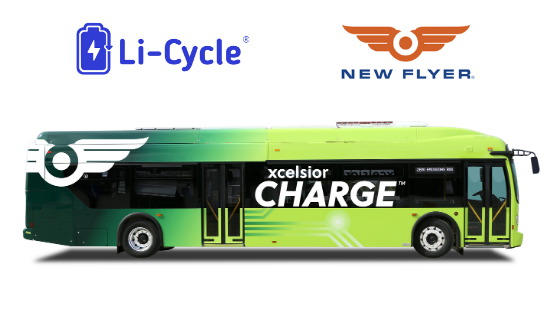



January 11, 2021



Partnership sustainably recycles over 3,200 pounds of lithium-ion batteries, creating a closed loop for electric bus batteries
ONTARIO, Canada, Jan. 11, 2021 /PRNewswire/ — Li-Cycle Corp. (Li-Cycle), North America’s largest lithium-ion battery recycling company, today announced its successful completion of a battery recycling pilot with New Flyer Industries Canada ULC and New Flyer of America Inc. (together “New Flyer”), subsidiaries of NFI Group Inc. (“NFI”), one of the world’s leading independent global bus manufacturers.
New Flyer provided Li-Cycle with 45 end-of-life lithium-ion battery modules (used for research and development) totaling 3,200 pounds; these batteries will be processed at Li-Cycle’s Spoke facility and turned into black mass, an industry term for a mixture of lithium, nickel, cobalt and copper. Li-Cycle’s Hub processes black mass in order to produce critical, battery-grade materials from recycled sources, as well as other recycled materials that can be returned to the economy.
“We are thrilled to team up with New Flyer to help spearhead the closed-loop resource recovery of electric bus batteries,” said Li-Cycle Chief Commercial Officer Kunal Phalpher. “As of 2019, approximately 425,000 of the world’s buses are electric. By recycling thousands of pounds of lithium-ion batteries, we’re serving the dual purpose of reducing hazardous waste, while recovering critical materials so they can be reintroduced into the supply chain. The compounded benefits of this partnership will have a significant positive environmental impact, which can be a model for cities around the world.”
Lithium-ion batteries have traditionally been impractical to recycle, creating hazardous waste and the loss of valuable, finite materials. Historically, many have been landfilled or partially recycled through pyro-metallurgical processes, which have only an average recovery rate of 40%. However, these methods are inefficient and lead to environmental decay, wasted resources, and have a negative impact on an otherwise environmentally friendly vision of electrification.
“As our customers transition to zero-emission mobility, they do so with a focus on cradle to grave sustainability. The demand for battery recycling is growing, so too is the desire to lessen environmental impact on our communities. Our pilot with Li-Cycle is delivering just this and we are optimistic in offering battery recycling in future,” said Chris Stoddart, President, New Flyer and MCI. “We’re committed to providing sustainable mobility solutions from procurement through vehicle retirement. Working with Li-Cycle delivers a triple sustainability benefit: we recover critical resources and divert them from landfills, provide them for re-use in the battery supply chain, and do so through Li-Cycle’s proprietary clean recycling process that minimizes impact to surrounding environments.”
New Flyer and Li-Cycle are both members of CALSTART, an international nonprofit dedicated to accelerating the pace of clean technology and the adoption of clean transportation.
Ajay Kochhar and Tim Johnston co-founded Li-Cycle in 2016 with a vision to be the most sustainable, vertically integrated and globally preeminent lithium-ion battery resource recovery company. Li-Cycle’s Spoke & Hub Technologies provide a low cost, safe, and environmentally friendly process that can recycle all types of lithium-ion batteries, with an unparalleled recovery rate of ≥95% of all materials. Li-Cycle’s industry-leading innovations make it uniquely positioned to support a key element of the growing international movement towards zero carbon technologies. The company recently closed a Series C equity funding round to fund further facility deployment and to drive expansion into international markets.
About Li-Cycle Corp.
Li-Cycle Corp. (Li-Cycle) is on a mission to leverage its innovative Spoke & Hub Technologies to provide a customer-centric, end-of-life solution for lithium-ion batteries, while creating a secondary supply of critical battery materials. Lithium-ion rechargeable batteries are increasingly powering our world in automotive, energy storage, consumer electronics, and other industrial and household applications. The world needs improved technology and supply chain innovations to better manage the end-of-life of these batteries – and to meet the rapidly growing demand for critical and scarce battery-grade materials through a closed-loop solution.
About New Flyer
New Flyer is North America’s heavy-duty transit bus leader and offers the most advanced product line under the Xcelsior® and Xcelsior CHARGE™ brands. It also offers infrastructure development through New Flyer Infrastructure Solutions™, a service dedicated to providing safe, sustainable, and reliable charging and mobility solutions. New Flyer actively supports over 35,000 heavy-duty transit buses (New Flyer, NABI, and Orion) currently in service, of which 8,600 are powered by electric motors and battery propulsion and 1,900 are zero-emission. Further information is available at www.newflyer.com.
